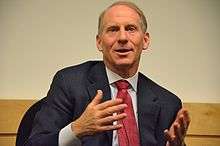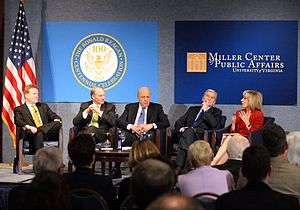Richard N. Haass
| Richard N. Haass | |
|---|---|
 | |
| United States Special Envoy for Northern Ireland | |
|
In office February 6, 2001 – June 20, 2003 | |
| President | George W. Bush |
| Preceded by | George Mitchell |
| Succeeded by | Mitchell Reiss |
| Director of Policy Planning | |
|
In office February 6, 2001 – June 20, 2003 | |
| President | George W. Bush |
| Preceded by | Morton Halperin |
| Succeeded by | Mitchell Reiss |
| Personal details | |
| Born |
Richard Nathan Haass July 28, 1951 New York City, New York, U.S. |
| Political party | Republican[1][2] |
| Spouse(s) | Susan Mercandetti (1990–present) |
| Children | 2 |
| Alma mater |
Oberlin College (BA) Wadham College, Oxford (MPhil, PhD) |
| Awards | Secretary's Distinguished Service Award |
Richard Nathan Haass (born July 28, 1951) is an American diplomat. He has been president of the Council on Foreign Relations since July 2003, prior to which he was Director of Policy Planning for the United States Department of State and a close advisor to Secretary of State Colin Powell. The Senate approved Haass as a candidate for the position of ambassador and he has been U.S. Coordinator for the Future of Afghanistan. He succeeded George J. Mitchell as the United States Special Envoy for Northern Ireland to help the peace process in Northern Ireland, for which he received the State Department's Distinguished Service Award. At the end of 2003, Mitchell Reiss succeeded him as special envoy. In late 2013, Haass returned to Northern Ireland to chair inter-party talks aimed at addressing some of the unresolved issues from the peace process such as parades, flags and "the past".[3]
Life and career


Haass was born in Brooklyn, to Jewish parents, the son of Marcella (née Rosenthal) and Irving B. Haass.[4][5] From 1989 to 1993, Haass was Special Assistant to United States President George H. W. Bush and National Security Council Senior Director for Near East and South Asian Affairs. In 1991, Haass received the Presidential Citizens Medal for helping to develop and explain U.S. policy during Operation Desert Shield and Operation Desert Storm. Previously, he served in various posts in the Department of State (1981–85) and the Department of Defense (1979–80).
Haass's other postings include Vice President and Director of Foreign Policy Studies at the Brookings Institution, the Sol M. Linowitz Visiting Professor of International Studies at Hamilton College, a senior associate at the Carnegie Endowment for International Peace, a Lecturer in Public Policy at Harvard University's Kennedy School of Government, and a research associate at the International Institute for Strategic Studies. A Rhodes Scholar, Haass obtained a B.A. from Oberlin College in 1973 and went on to earn both a Master of Philosophy and Doctor of Philosophy from Oxford University.[6]
Throughout the 2008 Presidential campaign, Haass advised several members of both the Republican Party and Democratic Party on issues regarding foreign policy, but did not publicly endorse a candidate due to the Council on Foreign Relations' non-partisan stance.[7]
In September 2013, Haass returned to Northern Ireland, with Professor Meghan O'Sullivan, to chair all party talks on flags, parades and the legacy of the Troubles, after violence flared over the removal of the union flag at Belfast City Hall. The talks broke up without reaching an agreement on December 31, 2013.[3]
Haass is the author of 12 books, of which 11 deal with matters of foreign policy and one with management. He lives in New York City with his wife, Susan Mercandetti,[8] and two children.
Foreign policy views
In a May 2015 interview with BBC's HARDtalk, speaking as President of the Council on Foreign Relations, Haass predicted that we are entering a new era in world history, in part due to the muting of U.S. dominance by the more diffuse power wielded by states and non-state entities as a result of the proliferation of nuclear arms and cyberterrorism, and several policy failures, which may bring about an "era of disorder" in the absence of any clear superpower. The failures in policy he points to are many of the rationales leading up to the 2003 invasion of Iraq, including the notion that the Iraqi regime had any involvement with the September 11 attacks or terrorism in general, but excluding the prominent intelligence of the time which indicated that Saddam Hussein's regime did most likely possess weapons of mass destruction, a point which he now concedes along with many of his colleagues and the international intelligence community "got wrong". He explained that he believes the existing problems of the region which were exacerbated by the "ill-advised" invasion of Iraq were compounded by subsequent errors, including the withdrawal of U.S. troops carried out under the Obama administration. Another major error, according to Haass, was the failure of the United States and the United Kingdom to intervene after it became clear that chemical weapons had been used during the Syrian civil war, leaving room for the Islamic State to gain a foothold. He has also stated he was against U.S. involvement in the Libyan Civil War, but said that if becoming involved was unavoidable, better follow up was an absolute necessity not fulfilled, resulting in a situation in which the people of Libya are "arguably worse off now than they were under the deeply flawed leadership of Muammar Gaddafi." These seemingly incongruous positions, he argues, demonstrate that consistency, when it comes to foreign relations, "is a bad idea", and that each situation requires a custom-fit approach. Maintaining a consistent interventionist or conversely non-interventionist foreign policy, for example, would be a mistake.[9]
Bibliography
- Beyond the INF Treaty (1988, ISBN 0-8191-6942-0)
- The Power to Persuade: How to Be Effective in Any Unruly Organization (1995, ISBN 0-395-73525-4)
- updated in 1999 as The Bureaucratic Entrepreneur: How to Be Effective in Any Unruly Organization (1999, ISBN 0-8157-3353-4)
- Economic Sanctions and American Diplomacy (1998, ISBN 0-87609-212-1)
- The Reluctant Sheriff: The United States After the Cold War (1997, ISBN 0-87609-198-2)
- After the Tests: U.S. Policy Toward India and Pakistan (1999, ISBN 0-87609-236-9)
- Transatlantic Tensions: The United States, Europe, and Problem Countries (editor, 1999, ISBN 0-8157-3351-8)
- Intervention: The Use of American Military Force in the Post-Cold War World (1999, ISBN 0-87003-135-X)
- Honey and Vinegar: Incentives, Sanctions, and Foreign Policy (2000, ISBN 0-8157-3355-0)
- The Opportunity: America's Moment to Alter History's Course (2006, ISBN 1-58648-453-2)
- War of Necessity, War of Choice (2009, ISBN 978-1-4165-4902-4)
- Foreign Policy Begins at Home: The Case for Putting America's House in Order (2013, ISBN 0-4650-5798-5)
References
- ↑ http://www.nndb.com/people/908/000119551/
- ↑ Drezner, Daniel W. (December 16, 2015). "A politically incorrect take on the GOP foreign policy debate". The Washington Post. Retrieved July 28, 2016.
- 1 2 "Haass Talks". BBC News. January 7, 2014. Retrieved January 8, 2014.
- ↑ The Reluctant Sheriff: The United States After the Cold War - Richard Haass - Google Books. Books.google.ca. 1997. ISBN 9780876091982. Retrieved 2014-01-08.
- ↑ Published: November 09, 1999 (1999-11-09). "Paid Notice: Deaths HAASS, IRVING B. - New York Times". Nytimes.com. Retrieved 2014-01-08.
- ↑ "Richard N. Haass biography". council on foreign relations.org. Retrieved January 8, 2014.
- ↑ Richard N. Haass - Council on Foreign Relations
- ↑ Published: November 18, 1990 (1990-11-18). "Richard Haass, Assistant to President, Weds Ms. Mercandetti, TV Producer - New York Times". Nytimes.com. Retrieved 2014-01-08.
- ↑ Montague, Sarah (4 May 2015). "President of the Council on Foreign Relations - Dr Richard Haass". BBC. Archived from the original on 23 May 2015. Retrieved 23 May 2015.
External links
| Wikimedia Commons has media related to Richard N. Haass. |
- Richard Haass — History Commons
- What to do with American Primacy
- State sovereignty must be altered in globalized era; An Article written by Richard Haass on the age of globalization.
- Council of Foreign Relations President Profile
- Appearances on C-SPAN
- Richard N. Haass on Charlie Rose
- Works by or about Richard N. Haass in libraries (WorldCat catalog)
- "Richard N. Haass collected news and commentary". The New York Times.
| Political offices | ||
|---|---|---|
| Preceded by Morton Halperin |
Director of Policy Planning 2001–2003 |
Succeeded by Mitchell Reiss |
| Diplomatic posts | ||
| Preceded by George J. Mitchell |
United States Special Envoy for Northern Ireland 2001–2003 |
Succeeded by Mitchell Reiss |